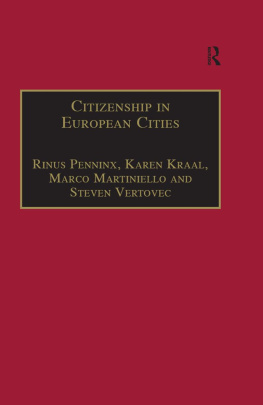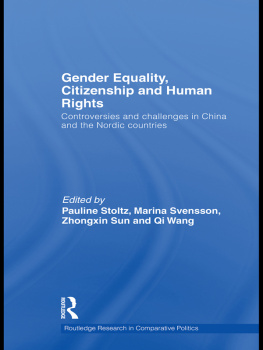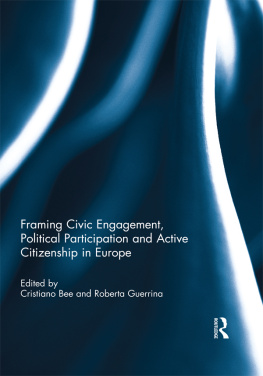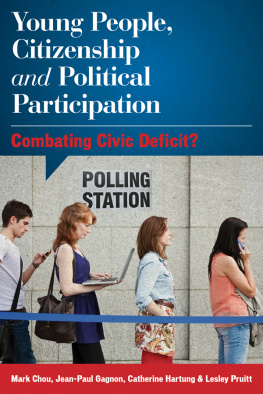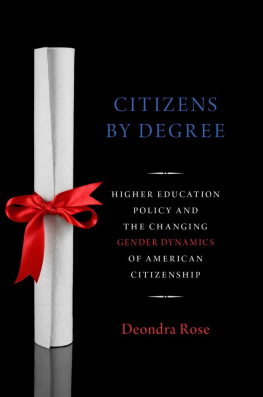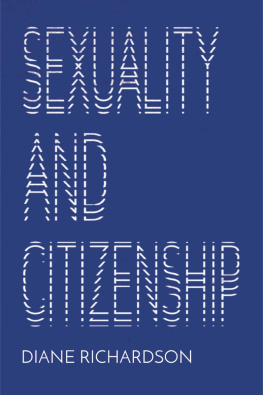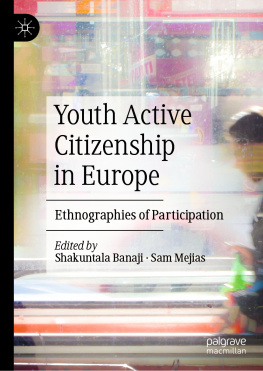GENDER, PARTICIPATION AND CITIZENSHIP IN THE NETHERLANDS
Gender, Participation and Citizenship in the Netherlands
Edited by
JET BUSSEMAKER
RIAN VOET
First published 1998 by Ashgate Publishing
Reissued 2018 by Routledge
2 Park Square, Milton Park, Abingdon, Oxon, OX14 4RN
711 Third Avenue, New York, NY 10017, USA
Routledge is an imprint of the Taylor & Francis Group, an informa business
Copyright J. Bussemaker and R. Voet 1998
All rights reserved. No part of this book may be reprinted or reproduced or utilised in any form or by any electronic, mechanical, or other means, now known or hereafter invented, including photocopying and recording, or in any information storage or retrieval system, without permission in writing from the publishers.
Notice:
Product or corporate names may be trademarks or registered trademarks, and are used only for identification and explanation without intent to infringe.
Publishers Note
The publisher has gone to great lengths to ensure the quality of this reprint but points out that some imperfections in the original copies may be apparent.
Disclaimer
The publisher has made every effort to trace copyright holders and welcomes correspondence from those they have been unable to contact.
A Library of Congress record exists under LC control number: 97078096
ISBN 13: 978-1-138-31647-8 (hbk)
ISBN 13: 978-0-429-45563-6 (ebk)
Contents
Jet Bussemaker and Rian Voet
Rian Voet
Jet Bussemaker
Tjitske Akkerman
Janneke Plantenga
Trudie Knijn
Annemieke van Drenth
Monique Leijenaar
Joyce Outshoorn
Jantine Oldersma
Tjitske Akkerman is an Assistant Professor at the Department of Political Science at the University of Amsterdam. She is the author of Womens Vices, Public Benefits: Women and Commerce in the French Enlightenment (1992) and co-editor of Perspectives on Feminist Political Thought in European History (forthcoming, 1997). She is currently writing a book on democracy. Her current research interests include gender and the history of the Dutch welfare state.
Jet Bussemaker is an Assistant Professor at the Department of Political Science and Public Administration at the Free University in Amsterdam. In 1997, she was a visiting scholar at the Centre for European Studies, Harvard University, Cambridge Mass. Her PhD thesis, published in 1993, received an award from the Dutch Organisation of Political Research. She has written widely on political theory, welfare states, gender and citizenship.
Annemieke van Drenth is an Assistant Professor at the Department of Womens Studies of Leyden University. In recent years she has been a Research Fellow on a grant from the National Science Association for the program Gender and Care. She has published on the history of girls education and women in social care. She is currently researching the life histories of lone mothers, and related social policy.
Trudie Knijn is an Associate Professor at the Department of General Social Sciences and Managing Director of the Centre for Economic and Social Policy Research of the Social Faculty (both at the University of Utrecht). She has published on a variety of topics in the field of private care relationships. Her current research is on the relationship between public and private care arrangements from a comparative perspective.
Monique Leijenaar is an Associate Professor of Political Science at the University of Nijmegen and a consultant for the Dutch government and several intergovernmental organisations. She has published several articles and books on local politics, election studies, women and politics. Her most recent work is How to create a gender balance in political decision-making (for the European Commission).
Jantine Oldersma is currently employed as an Assistant Professor at the Department of Womens Studies in the Social Sciences at Leyden University. She studied political studies at the University of Amsterdam and received her PhD at Leyden University. She has published on women in politics, policies on women, feminism and popular culture, and on feminist detectives.
Joyce Outshoorn is Professor of Womens Studies at Leiden University, the Netherlands, and is Chairperson of the Netherlands Research School for Womens Studies. She studied political science and contemporary history at the University of Amsterdam. Her current research focuses on womens public policy, womens movements, and abortion policy.
Janneke Plantenga is an Assistant Professor at the Economic Institute of the University of Utrecht. She has a PhD in economics from the University of Groningen. Her main fields of interest are the history of womens work, changing working time patterns, and social policy. Together with Geske Dijkstka she edited Gender and Economics: A European Perspective (1997).
Rian Voet is an Assistant Professor at the Department of Political Studies of the University of Auckland, New Zealand. She obtained her PhD in political studies at Leyden University and. is the author of Feminism and Citizenship (forthcoming 1997). Her teaching and research topics include political theory, women and politics, identity politics, and lite theory.
Over the last few years many Dutch academics have been working on questions concerning participation, citizenship and gender. This book emerged from a shared conviction that a judicious selection of some of their recent projects should be made accessible to a wider audience by being published in English. All of the chapters in this book appear for the first time in print, in either language. The contributing authors are all recognised Dutch academics in the areas of economics, education, political science, social policy or womens studies.
It is the aim of the editors that this book will prove a useful contribution to international scholarship with regards to the interdependence of definitions of gender, participation and citizenship. While providing details specific to conditions in the Netherlands, the chosen contributors relate their discussions to international and theoretical scholarship.
Distinctive features of the Dutch social and political environment highlight the utility of the chosen country-specific examples to comparative studies and theoretical arguments. Some of the distinctive characteristics covered in this volume are: consociational democracy, the comprehensive welfare state structure, gender-specific policies and subsidies, the combination of feminist ideas and traditional gender division of labour, pillarisation, individualisation, corporatism, the popularity of civic republicanism and communitarianism, and the influence of Christian-Democratic ideas.
This book has been written with both the general reader and specialist in mind and has therefore been kept as jargon-free as possible.
In the preparation of this book we have benefited from the supportive environment of the European Network for Research on Women, Welfare State and Citizenship. For various reasons some authors who once were involved, could not be included in the final book. We would like to mention here Odile Verhaar (Free University Amsterdam) as well as Selma Sevenhuijsen (Utrecht University).




